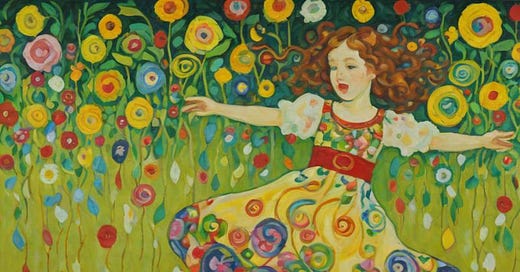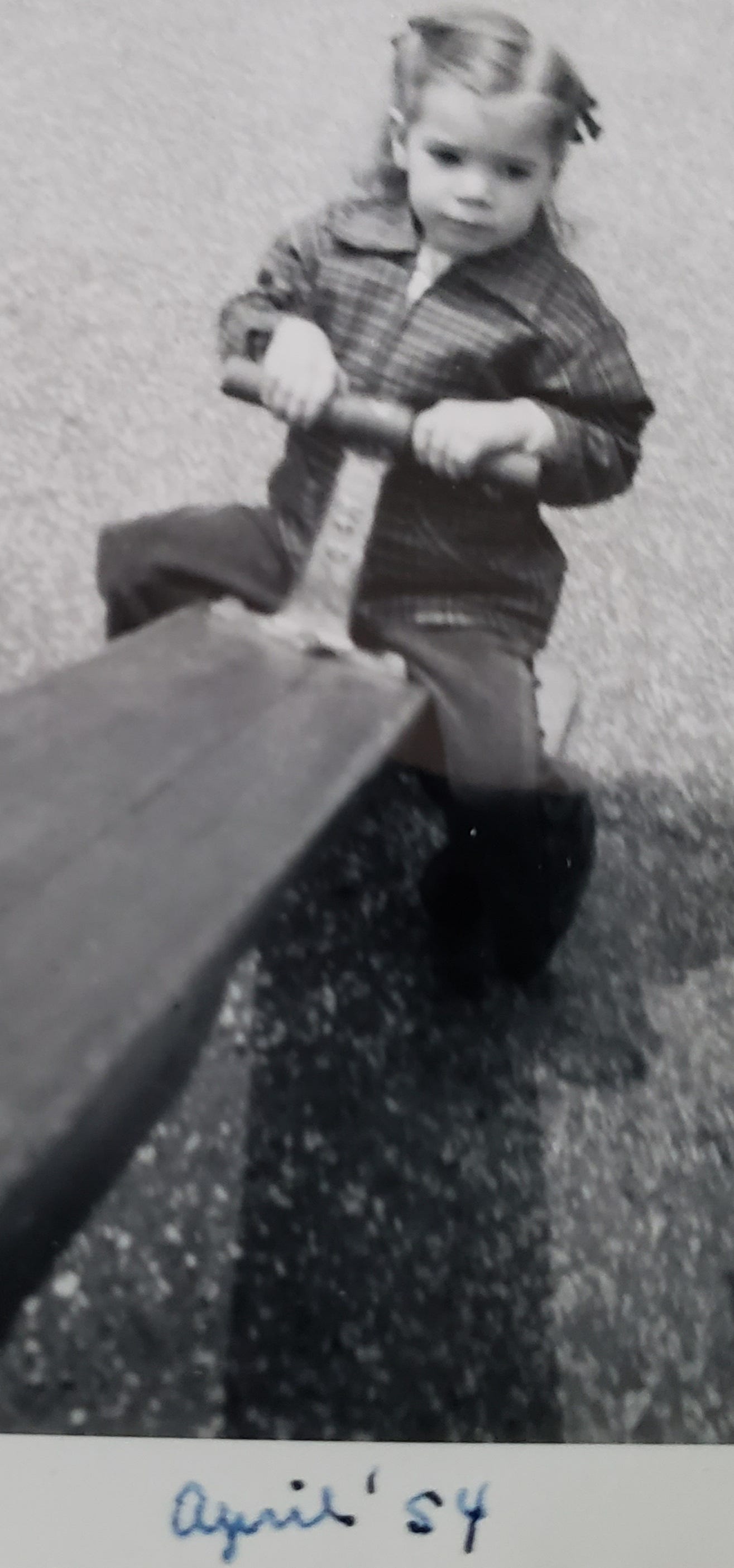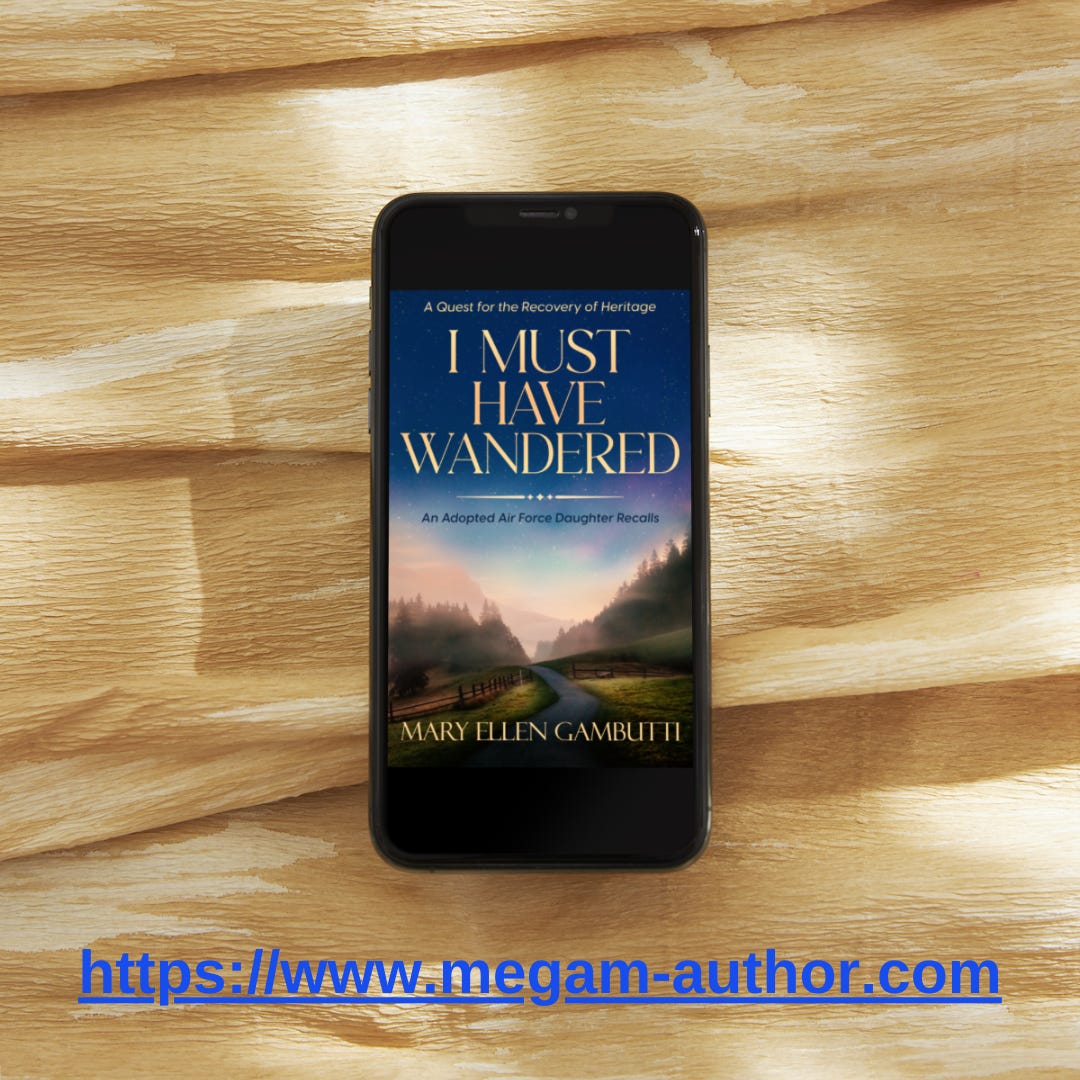Dear Readers, Thank you for stopping by! At this time, a free subscription to my newsletter is the best way to support my writing. You’ll receive my email posts weekly.
Today, I offer the first of two segmented prose poems around an adoptee’s complex emotions. I’m a seeker and writer, not a scholar, therapist, or counselor, but the traumas of infant relinquishment, abandonment, loss, and the quest for a natural family, for identity and heritage seem to lend themselves to the forms hero/heroine’s journey, myth, fable, fantasy, and fairytale.
Let’s say the child, adopted at fourteen months by a military couple, is bright and sensitive, usually assertive, and confident, but a series of separations from birth continue through elementary school transfers and school changes, and her sensitivity, anxiety, and fears grow. In high school through young adulthood, her physical and emotional problems heighten with mood swings, depression, and panic. Was this all the result of the “primal wound” of infant-maternal severence, an upbringing by well-meaning, but disciplinarian parents, or the practices of the Baby Scoop Era, sealed birth records, and restrictive adoption laws denying access to our identity? I believe, all of the above. I hope you will find something of value in my work. I invite your comments.
Warm regards, Mary Ellen
To Sing Her Own Song
Part One. Sense of Self
“The journey is the adoptee’s heroic attempt to bring together the split parts of the self. It is an authentic way of being born again. It is a way of taking control of one’s own destiny, of seizing power. It is a way of finding oneself.”
—Betty Jean Lifton, Journey of the Adopted Self
Mother shows her how to pierce the succulent stems to thread sweet white and rose clover into chains, to twist and twine them into necklaces, with wild grass, white field daisies, shaggy golden lions, dandy white wild daisies, picked in the empty lot that lies next to the new home. The family of three has lived many elsewheres since Questa came to live with them. They moved, made moves — more to come. The little girl has no plans only to pick the flowers and sing and twirl. She knows the words. The words come to her along a tune. A fragmented tune comes along to play from Mother’s brown Stromberg-Carlson counter-top radio. It comes on a fragment, a piece of melody that comes out whole with Questa’s words inside it, becomes her own song with a full feeling of happiness, marking, counting time. No time but all time there is nothing but sing the sky and flowers. Sing strong and high. She belts out her strong song! hears her loud voice, feels the fragrant weeds the flowers smells them dangling around her neck. Love in words and tunes about ones who love her grows naturally, like a story story in her heart, in her arms, her legs. She spins the story. Her story spins her. Her brown hair is pinned back in barretts, in soft waves, in rings, ringlets, curls, corkscrews and it falls on her shoulders. Questa spirals on the sunny grass and stumbles and she drops down dizzy, and laughing, she gets up giddy, still dizzy around around the white birch clumps where little pools of water collect for sparrows to sip. Her song is only hers hers alone. Her world her song, the song no one knows.
Adopted was a whisper. A story. Make-believe. Not in the new house. In Texas she is six. Her father has gone again in blue. Away he’ll be a year again. A year in Tokyo this time, last time somewhere cold as ice. When he’s home, her father tells her a new story about some ones she doesn’t know. She hears something — the world her Mom and Dad made for her has others, not theirs. Are they mine? The parents who give her places to live now tell her there are ones who were lost. Lost to her, lost from her. Am I lost? She doesn’t ask, quiet, listening. She hasn’t imagined others, — here. She’s heard and now he says again Adopted. But not this mother? Another mother? Questa looks away from the storyteller to her doll baby on the bed. Can’t look at him while he talks near the head of her bed at the head of her bed, and her mother is standing at the foot of Questa’s bed where Questa kneels. And she almost wonders will they leave me, too? She knows her father leaves. She almost knows they will. Anything can change at any time. Houses, mothers, fathers might come and go, can come and go.
Something in Questa’s heart that was a song is something new that makes her wonder. So she wonders about the ones she never thought of, has not imagined — the ones who are missing. Her parents protect her so she lets them keep her safe and doesn’t ask. They don’t seem to wonder, they don’t seem sad, don’t seem worried for the missing ones. She is their girl, no one else’s, theirs alone. Who has the others, the ones who are gone? Are they a family, family — were they a real family? She wonders. Gone. Lost. An accident. Lost In an accident, and I was found. I was left behind and found. She imagines a roadside, maybe a grassy ditch. Dark woods. She imagines a little girl walking away. I was the little girl. Was I a baby? Did they die or walk away? Did someone pick me up? No one tells the whole story. They don’t seem to know the whole story, and Questa doesn’t know how to ask. In her dream, she walks away so she can live. Her song is lonely. She sings a lonely song.
Standing on the step stool, Questa looks in the mirror. Mirror, mirror on the wall, to see for herself: Who do I look like? Do I look like someone? She squints in the mirror to see her mouth, her eyes, her cheeks, her hair. No one looks like her. Not Mother or Daddy. Which ones look like her? Who should look alike? She knows brothers and sisters who look alike. She only looks like herself and no one else. Questa is sort of sad she looks like no one. Someone is missing. “You’re not like the other children. You are only like you, an only child,” said her mom and dad. But she doesn’t like to be different. I must, I should be like someone else.
In the fairytale, the mirror is talking to the evil queen who looks in the mirror. Hansel and Gretel wandered from their home, leaving their mother. They wandered into the dark forest. Wandered to a witch’s house. Wandered and got lost. I wandered from the accident, maybe into the woods. Did I leave the others, or did they leave me? If you leave your parents, find new ones to give you a house, and nice clothes, not Cinderella rags. Stay away from the forest where the witch lives. Find parents to protect you and not leave you in a ditch or try to shove you in an oven. She wonders whether adopted is like having a stepmother or a witch mother. Were Hansel and Gretel adopted, too? She wants to see the lost ones’ faces. Know their names. When she is called by her name, she knows to come. When you are adopted, you lose names. Your first family’s names. At seven, Questa can’t yet imagine the tragic truth behind this loss.
Questa imagines, and never stops wondering about the missing ones. Sometimes she has a thought that when she’s grown up she’ll know. She’ll find out why her first family went away. She doesn’t think she’s allowed to wonder and she worries whether she’ll ever know how to ask. The fantasies, the tales, the lies, the secrecy. She keeps to herself. Needs to keep the stories the phantom tales to herself. To imagine the missing ones she writes the poems, sings the songs, to herself, to anyone who’ll listen. Her adoptive parents aren’t listening. Who believes her? She’ll sing her own song — A song no one else knows.

To be continued.







I can relate to all the moving from place to place, the constant questioning, feelings of abandonment, and the panic, oh, that panic. It's a wonder we turned out halfway normal. I wish you peace and acceptance in the coming years.....writing is crucial to understanding. Thank you, as always, for your words and stories.
The way your write about Questa brings us right into the heart and mind of this child. Her questions, her fears, her longings, her questions, so many unanswered and so many she cannot ask. I can relate to this.